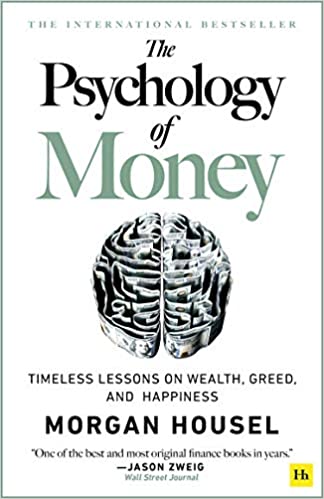This post is part of the 📖 The Psychology of Money series.
Today, I am reading Reasonable > Rational chapter from the book The Psychology of Money: Timeless lessons on wealth, greed, and happiness written by Author, Morgan Housel.
Doing well with money isn’t necessarily about what you know. It’s about how you behave. And behavior is hard to teach, even to really smart people.
In The Psychology of Money, award-winning author Morgan Housel shares 19 short stories exploring the strange ways people think about money and teaches you how to make better sense of one of life’s most important topics.
Yesterday, I finished reading the 10th short story Save Money from the book The Psychology of Money.
Reasonable > Rational
Aiming to be mostly reasonable works better than trying to be coldly rational.
The historical odds of making money in U.S. markets are 50/ 50 over one-day periods, 68% in one-year periods, 88% in 10-year periods, and (so far) 100% in 20-year periods. Anything that keeps you in the game has a quantifiable advantage.
Invest in a promising company you don’t care about, and you might enjoy it when everything’s going well. But when the tide inevitably turns, you’re suddenly losing money on something you’re not interested in. It’s a double burden, and the path of least resistance is to move onto something else.
Suppose you’re passionate about the company and you buy the stocks. In this case, you love the mission, the product, the team, the science, whatever — the inevitable down times when you’re losing money or the company needs help are blunted by the fact that at least you feel like you’re part of something meaningful.
That can be the necessary motivation that prevents you from giving up and moving on.
Day trading and picking individual stocks is not rational for most investors — the odds are heavily against your success. But they’re both reasonable in small amounts if they scratch an itch hard enough to leave the rest of your more diversified investments alone.
Key Takeaways
- The reasonable investors who love their technically imperfect strategies have an edge because they’re more likely to stick with those strategies.
That’s it for today. Tomorrow, we will read the next chapter Surprise!, history is the study of change, ironically used as a map of the future.
No One’s Crazy
Every decision people make with money is justified by taking the information they have at the moment and plugging it into their unique mental model of how the world works.
Luck & Risk
Nothing is as good or as bad as it seems. More important is that as much as we recognize the role of luck in success, the role of risk means we should forgive ourselves and leave room for understanding when judging failures.
Never Enough
There are many things never worth risking, no matter the potential gain. Knowing when you have “enough” is an invaluable skill. Building a sense for “enough” is remarkably simple: Stop taking risks that might harm your reputation, family, freedom and independence.
Don’t forget that being loved by those “whom you want to love” is invaluable than risking everything for money.
Confounding Compounding
Good investing isn’t necessarily about earning the highest returns. It’s about earning pretty good returns that you can stick with and which can be repeated for the longest period of time.
Getting Wealthy vs Staying Wealthy
Good investing is not necessarily about making good decisions. It’s about consistently not screwing up. There are a million ways to get wealthy and plenty of books on how to do so. But there’s only one way to stay wealthy: some combination of frugality and paranoia.
Getting money is one thing. Keeping it is another. If you have to summarize money success in a single word, it would be “survival”.
Tails, You Win
Gains come from a small per cent of your actions called “Long Tail Events”. You can be wrong half the time and still make a fortune. Remember, tails drive everything. Just do the average thing when all those around you are going crazy.
Freedom
Controlling your time is the highest dividend money pays. The ability to do what you want, when you want, with who you want, for as long as you want, is priceless. It is the highest dividend money pays.
Man in the Car Paradox
If respect and admiration are your goals, be careful how you seek them. Humility, kindness, and empathy will bring you more respect than horsepower ever will.
Wealth is What You Don’t See
Wealth is hidden. It’s income not spent. Wealth is an option not yet taken to buy something later. Its value lies in offering you choices, flexibility, and growth to one day purchase more stuff than you could right now.
Save Money
Savings can be created by spending less. You can spend less if you desire less. And you will desire less if you care less about what others think of you.
Reasonable > Rational
You’re not a spreadsheet. You’re a person. A screwed up, emotional person. When it comes to investing, try to be reasonable rather than rational.
Buy or not to buy
If you want to be wealthy and then stay at the totem pole forever, you must immediately read this book. I bought several copies of this book to gift friends and family. It’s an easy read with a lot of anecdotes and real-life lessons. I already implemented several hacks in my life whistle taking investment decisions.
Author(s): Morgan Housel
Part 13 of 23 in the 📖 The Psychology of Money book series.
Series Start | The Psychology of Money: Timeless lessons on wealth, greed, and happiness - Day 12 | The Psychology of Money: Timeless lessons on wealth, greed, and happiness - Day 14
